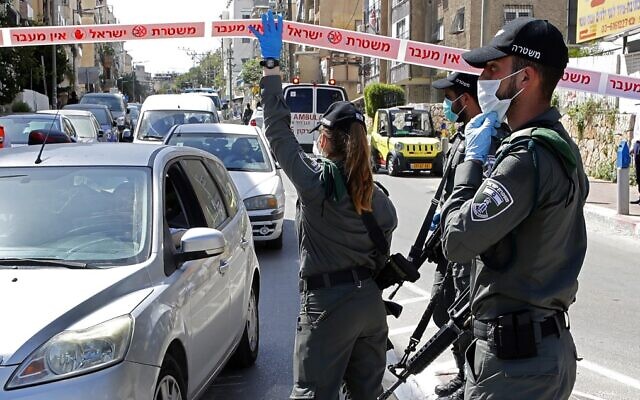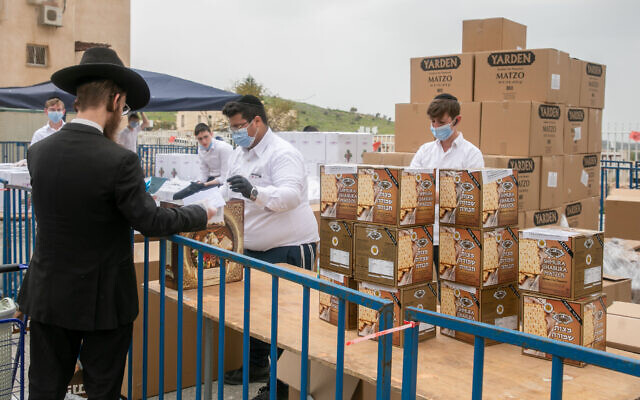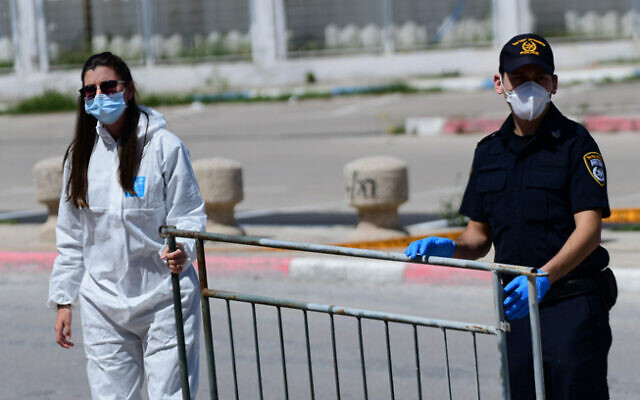Ministry source says Elad, Migdal Haemek, Modiin Illit, and ultra-Orthodox neighborhoods of Jerusalem and Beit Shemesh should join Bnei Brak as restricted zones

A senior Health Ministry official on Saturday called for additional areas in Israel with a high number of coronavirus cases to be declared restricted zones, allowing the government to further curtail movement in these places in a bid to limit the virus’s spread.
Among the cities the official cited to Hebrew media were several with predominantly ultra-Orthodox populations, such as Elad and the West Bank settlement of Modiin Illit, as well as several Haredi neighborhoods in Jerusalem and Beit Shemesh.
Deliberations were set to be held on the matter Saturday evening, according to Channel 12 news.
The official also named the northern city of Migdal Haemek as a virus hotspot that should be declared a restricted zone and said additional restrictions on movement should be enacted in the places that have recorded a significant number of COVID-19 cases.

On Thursday, the cabinet approved declaring the ultra-Orthodox city of Bnei Brak a restricted zone, effectively locking down the area.
The order restricted movement into and out of the city, with entrance limited to residents, police, rescue services, those bringing essential supplies and journalists.
The lockdown will initially last for seven days, with the option for ministers to extend for additional five day periods.
Bnei Brak, a Tel Aviv suburb with a population of nearly 200,000, has the second highest number of coronavirus cases in Israel after Jerusalem, despite having close to five times less people living there.
In the new emergency ordinances approved Thursday, the cabinet also okayed the formation of a ministerial committee headed by Prime Minister Benjamin Netanyahu that will be charged with determining whether additional towns should be declared restriction zones in order to curb the outbreak.
The government has not publicly named any other places that could be declared restricted zones.
As part of the new restrictions on movement in Bnei Brak, police said Saturday that Route 481, a main traffic artery in the Gush Dan metropolitan region that is also known as Jabotinsky Street, would be closed between the Geha Interchange and Ben Gurion Junction in Ramat Gan.
The closure will take effect at midnight.
Police on Saturday were also enforcing the restrictions in Bnei Brak and set up checkpoints at entrances and exits to the city.

On Friday, the deputy mayor of Bnei Brak called the decision to close off his city “a death trap for the city’s elderly” and urged the governments to consider other ways to stop the spread of coronavirus.
His call came as the government tasked the Israel Defense Forces with formally providing “civil assistance” to residents as police established checkpoints at the entrances and exits of the ultra-Orthodox city on the outskirts of Tel Aviv.
Gedalyahu Ben Shimon said the lockdown has caused uncertainty, leading “many city residents to flood a limited number of supermarkets, thus increasing the danger of infection.”
“As opposed to a curfew, where the army takes full responsibility for the hundreds of thousands of residents and provides them with food and medicine, here they’ve taken a half-measure that raises the odds of contagion and could cost human lives. A course correction is required,” he said.
The head of the IDF Home Front Command, Maj. Gen. Tamir Yadai, confirmed that the army would only be supplying necessities to the most at-risk people.
Most of the army effort would focus on helping evacuate the sick and elderly from the city, he said, adding, “No one will be evacuated by force, only voluntarily.”
On Friday, the Health Ministry said there were 966 virus cases in Bnei Brak, 418 of which were confirmed in the past three days.
Yadai said the military anticipated being sent to additional parts of the country that were struggling with the pandemic.
Police have continued to operate and try and enforce the social distancing guidelines, with some members of the ultra-Orthodox community continuing to resist bans on communal prayer and holding mass services despite restrictions. Police have been increasing enforcement, handing out fines and closing down rule-breaking institutions.
As reported by The Times of Israel
